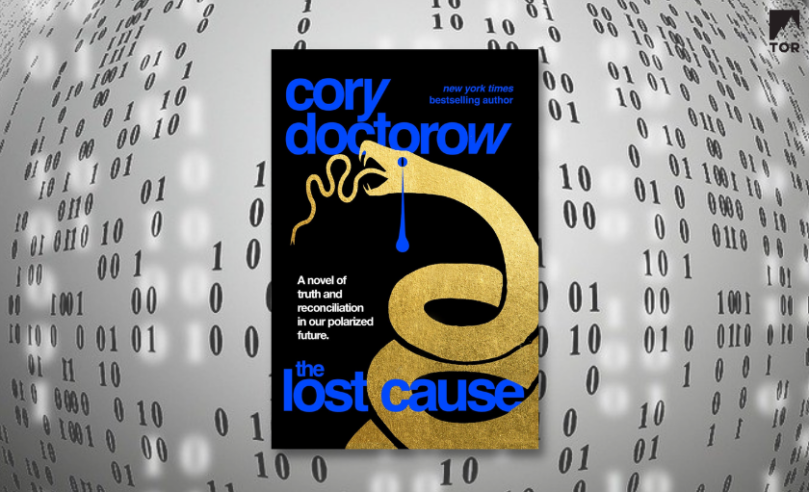It’s thirty years from now. We’re making progress, mitigating climate change, slowly but surely. But what about all the angry old people who can’t let go?
For young Americans a generation from now, climate change isn’t controversial. It’s just an overwhelming fact of life. And so are the great efforts to contain and mitigate it. Entire cities are being moved inland from the rising seas. Vast clean-energy projects are springing up everywhere. Disaster relief, the mitigation of floods and superstorms, has become a skill for which tens of millions of people are trained every year. The effort is global. It employs everyone who wants to work. Even when national politics oscillates back to right-wing leaders, the momentum is too great; these vast programs cannot be stopped in their tracks.
But there are still those Americans, mostly elderly, who cling to their red baseball caps, their grievances, their huge vehicles, their anger. To their “alternative” news sources that reassure them that their resentment is right and pure and that “climate change” is just a giant scam.
And they’re your grandfather, your uncle, your great-aunt. And they’re not going anywhere. And they’re armed to the teeth.
The Lost Cause asks: What do we do about people who cling to the belief that their own children are the enemy? When, in fact, they’re often the elders that we love?
Please enjoy this free excerpt of The Lost Cause by Cory Doctorow, on sale 11/14/23
Chapter 1
gramps’s secret
I love Burbank City Hall. It’s the perfect marriage of everything I love about this town: a WPA building celebrating solidarity with beautiful murals and frescoes, but also a theatrical building, with an art deco facade that’s got this Disneyland-grade forced perspective thing going on that makes it seem twice as tall as it really is. Someone really good at set design had planned the building, and it was impossible to take a bad picture in front of it, whether it was the mayor at her podium giving a presser, or a group of protesters holding signs—it always came out looking like you were starring in some kind of movie.
The first time I’d gone there was in the ninth grade, on a civics evening field trip when we’d all dressed up in our bar mitzvah and confirmation suits to sit in the gallery during a council meeting. The meeting had been boring af, but the building made an impression.
I didn’t go back inside for years, but every time I passed it, I got a little squirt of civic pride, so the field trip had done its job. Then in junior year I started hanging out with kids whose parents were in the Democratic Socialists of America and going out with them to the annual Federal Jobs review meetings or other high-stakes council sittings, and I gained a new appreciation for the place, all the old brass and the beautiful wood paneling in the council chamber. I even liked the ground-floor overflow chamber.
But the first time I went back after Gramps died, it was different. I was used to seeing people from his Maga Club there, speaking about why they should get their Jobs Guarantee allocations, and I knew that they’d rat me out to him afterward. But with Gramps dead, I had this feeling like maybe they’d ambush me on the way home, squirt me with acid or put a bullet in my brain.
But I wasn’t gonna let them scare me off. I went with a big group of friends—thirty of us, all recent grads from Burroughs—and we met up with a bunch of other groups on those dramatic steps and hung out together on our side, while the Maga Club stood on their side, glowering at us from under their red trucker
caps, frayed and faded like badges of honor. Like old battlefield ribbons.
The city held these Jobs Guarantee reviews every year, and every year the Maga Club organized a huge crowd of old white dudes to show up and argue that the Federal Jobs Guarantee should fund organizations devoted to dismantling the Federal Jobs Guarantee (and every other Green New Deal program). At first it had just been a troll, but now they scooped up a third of the Jobs Guarantee positions and it was hurting the city’s ability to fund positions for things we really needed, including (ironically) the home helpers that cleaned these old dudes’ houses and gave them sponge baths and trimmed their hedges.
When they let us in, we went up the stairs in our separate groups but a lot of the Magas took the elevators and emerged in our midst, so we were all mixed up together by the time we got to the metal detectors, which were always a mess anyway. The old guys started it, shoving and elbowing in the way they did, and then some of our side pushed back and before you knew it, everyone was trash-talking and shouting, and then one of the Maga guys called someone a “wetback” and suddenly the rotunda was a roar of voices.
I was toward the back of the line behind a skinny redheaded guy who had a little notepad that he kept making additions and scribbles on with a golf pencil. When the noise level peaked he looked up from his pad and made eye contact with me.
“What’s going on?” he said, craning to see. He was short and had a kind of weird, awkward affect, and he had a huge lapel pin with @DAWGFARTZZZ@LAFFLAND that I wished I’d noticed before I’d caught his eye.
“Politics,” I said with a shrug, loud enough to be heard over the roar of voices. “It’s Jobs Guarantee night.”
He looked puzzled, then he worked out what I was talking about and shrugged. “I don’t pay attention to any of that stuff. Just here for the mic. Are you doing a set?”
“No,” I said. “I’m here for the politics.”
He snorted and went back to his notepad.
The Burbank city charter required that every council meeting include an open comment period where anyone could stand up and speak for up to five minutes. And the city had settled a public records lawsuit decades before by promising to livestream and archive its meetings, originally to YouTube and these days to GovTube, one of the tubes left over from the breakup.
No one knows which of the would-be comedians of the world first got the idea to use these public comment periods as an open mic to work out new material, but the rumors were that half the comedians working today were “discovered” on city-hall cams and boosted over social into fame and fortune.
It was catnip for anyone who thought they were funny, and city councilors and mayors were such a tough audience—to say nothing of the people stuck in the chamber, waiting for a chance to speak about zoning or school funding while some asshole tried to be funny at the podium—that any laughs they got were worth a thousand times more than a laugh in a club.
That’s what this little redheaded guy was here for, and why he had his twitter handle on his chest in giant block letters. I had no idea if he’d be funny, but DAWGFARTZZZ with three z’s didn’t bode well.
The shouting up ahead died down and a couple of Magas stormed past me, evidently ejected for bad behavior, and then a couple of people from our group that I knew by sight, but couldn’t name. They went to Burbank High, and I’d seen them at varsity matches and the odd party.
“Everything okay?” I asked a young-looking Latina girl, whose face was set in grim fury.
“What?” She looked at me, seemed to recognize me. “Oh. Yeah. I guess. Those assholes”—she jutted her chin at the backs of the departing Magas—“started shoving at the security checkpoint and so I dropped one of them on his ass.” She grinned suddenly, revealing neat, small, very white teeth. “Guess all those years of jiujitsu were worth something.”
I low-fived her and she chucked me on the shoulder on her way out, a bounce in her step that hadn’t been there before, which I felt good about. It would suck to get kicked out even before the meeting started. She’d taken one for the team.
The redheaded guy gave me a little more space, like he was starting to understand that “politics” wouldn’t be the boring part of the night.
We filled both sides of the gallery and lined the back walls and then the security guards closed the room and started shouting at the people still outside to go back downstairs to the overflow room. The councilors were already seated, along with the mayor and deputy mayor, the city attorney, and the secretary. The big screens showed the streaming view of the room and let us watch as the overflow room filled up. Because we were split in two rooms it was hard to tell whether the Magas were outnumbered by the good guys, but I thought we might have had an edge.”
“I guess they were right about demographic replacement,” said the person sitting next to me. I knew her name, but it took me a second to place her. Milena. She’d been a couple of years ahead of me at Burroughs and I’d seen her around doing Jobs Guarantee work in the years since she graduated—doing efficiency upgrades to old people’s houses, working the shelters during the flood-rains that washed out a couple of the hillside streets.
“What do you mean?”
“Well, they keep getting older and dying off, and no one’s making any new Magas, at least not fast enough to replace the ones that are kicking the bucket. Meanwhile, people like you keep on graduating from high school and showing up here. Demographics are destiny.” She shrugged and smiled. “Like maybe if we just waited a couple years, these guys’d take care of themselves. They’re awfully fond of shooting each other, too.”
I must have grimaced.
“Sorry, I don’t mean to be flippant. Obviously that stuff is terrible, but—”
“It’s okay,” I said. “I knew that guy who got shot.”
“Oh, shit. Dude, I’m so sorry—”
“No, it’s okay, really. He tried to kill me right before they killed him.”
“Wait—” I saw her putting it together. “Dude, wow. I’m so sorry. I just hadn’t made the connection. That’s such a fucked-up thing that happened to you. Are you okay? Like emotionally?”
I felt myself grimace again. “Sort of. I guess. It’s a long story.” She gestured at the front of the room, where the councilors and the secretary and the attorney were all conferring.
“We got time. If you want someone to talk to. If not, that’s cool too.”
She and I hadn’t really crossed paths much in school—and we’d seen each other even less since, but I’d always liked her and to tell the truth, I’d been pretty isolated since graduation.
“Well, you know. It’s just.” I took a breath. “My grandfather died right around then, too. He was all the family I had and I didn’t actually like him very much but now I’m the last of the family line and I’m all alone in the house full of his stuff, trying to figure out what to do with myself. I’d planned to go down to Capistrano to do a Green New Deal year after grad, but I gotta do something with the house first, and it’s just such a big, stupid project that I don’t know where to start.”
“Oh, man. That sounds intense. Are you okay for money and stuff?”
I shrugged. “I think so. The credit union had just upgraded to comply with the new probate rules, so they let me into Gramps’s checking account after he died to pay for expenses and the funeral. Whenever I need a bag or two of groceries I just do some Green New Deal stuff around town, but it’s just a holding pattern. I just can’t seem to get anything started—not the house, not going down the coast, not getting to university.”
“Maybe you should see a counselor. It sounds like you’ve been through a lot.”
“I did some online counseling, and it helped a little, but maybe I should do some more.”
“Maybe you should.” She gripped my shoulder and gave it a friendly shake. “Maybe you just need a little perspective, you know? Like, I’m still living with my family and I love them and all, but they drive me crazy. And that Green New Deal work you’re doing? I know it can feel like shitwork, but remember that you’re making an actual difference. You’re literally saving our city—our civilization—our species!”
I laughed. “You sound like Hartounian.” She laughed too. Hartounian was Burroughs’s GND teacher, and her classes were always like sermons. You could sometimes hear them from the next classroom over. Gramps had invoked “freedom of conscience” to keep me out of GND classes in elementary and middle school, but he couldn’t keep me out of them in high school and I’d loved ’em.
Evidently Milena shared my enthusiasm, because she busted out a pitch-perfect Hartounian impression: “Yours is the first generation in a century that did not grow up fearing for your future. Do you have any idea how incredible that is?”
I laughed. It was the most Hartounian of all possible quotes and she was perfect at it.
“I miss her. Her class was the best.”
She shook her head. “She’s over there, dude,” and yeah, she was, sitting a couple of rows ahead and off to one side. “Ms. H!” Milena called, and she turned around and recognized both of us and beamed, then blew us both kisses.
“It’s so weird seeing teachers outside of school,” I said.
“Get used to it, you gonna stay in Burbank. It’s a small town.” The mayor called the meeting to order and we all settled in.
Copyright © 2023 from Cory Doctorow
Pre-order The Lost Cause Here:












